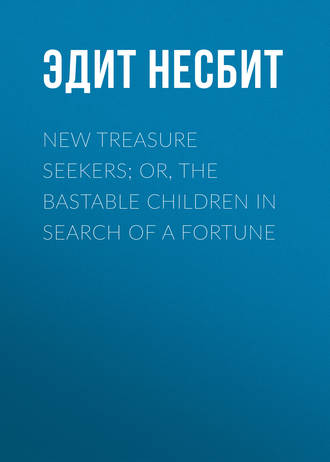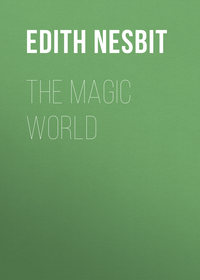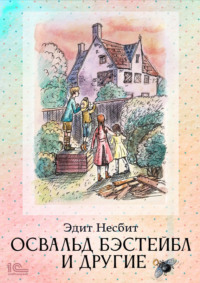 полная версия
полная версияNew Treasure Seekers; Or, The Bastable Children in Search of a Fortune
When it came to Father's speaking to H.O. that evening it never came off, because H.O. was ill in bed, not sham, you know, but real, send-for-the-doctor ill. The doctor said it was fever from chill and excitement, but I think myself it was very likely the things he ate at lunch, and the shaking up, and then the bread and cheese, and the beer out of a can.
He was ill a week. When he was better, not much was said. My Father, who is the justest man in England, said the boy had been punished enough—and so he had, for he missed going to the pantomime, and to "Shock-Headed Peter" at the Garrick Theatre, which is far and away the best play that ever was done, and quite different from any other acting I ever saw. They are exactly like real boys; I think they must have been reading about us. And he had to take a lot of the filthiest medicine I ever tasted. I wonder if Father told the doctor to make it nasty on purpose? A woman would have directly, but gentlemen are not generally so sly. Any way, you live and learn. None of us would now ever consent to be a stowaway, no matter who wanted us to, and I don't think H.O.'s very likely to do it again.
The only meant punishment he had was seeing the clown's dress burnt before his eyes by Father. He had bought it all with his own saved-up money, red trimmings and all.
Of course, when he got well we soon taught him not to say again that it was any of our faults. As he owned himself, he is our little brother, and we are not going to stand that kind of cheek from him.
THE CONSCIENCE-PUDDING
It was Christmas, nearly a year after Mother died. I cannot write about Mother—but I will just say one thing. If she had only been away for a little while, and not for always, we shouldn't have been so keen on having a Christmas. I didn't understand this then, but I am much older now, and I think it was just because everything was so different and horrid we felt we must do something; and perhaps we were not particular enough what. Things make you much more unhappy when you loaf about than when you are doing events.
Father had to go away just about Christmas. He had heard that his wicked partner, who ran away with his money, was in France, and he thought he could catch him, but really he was in Spain, where catching criminals is never practised. We did not know this till afterwards.
Before Father went away he took Dora and Oswald into his study, and said—
"I'm awfully sorry I've got to go away, but it is very serious business, and I must go. You'll be good while I'm away, kiddies, won't you?"
We promised faithfully. Then he said—
"There are reasons—you wouldn't understand if I tried to tell you—but you can't have much of a Christmas this year. But I've told Matilda to make you a good plain pudding. Perhaps next Christmas will be brighter."
(It was; for the next Christmas saw us the affluent nephews and nieces of an Indian uncle—but that is quite another story, as good old Kipling says.)
When Father had been seen off at Lewisham Station with his bags, and a plaid rug in a strap, we came home again, and it was horrid. There were papers and things littered all over his room where he had packed. We tidied the room up—it was the only thing we could do for him. It was Dicky who accidentally broke his shaving-glass, and H.O. made a paper boat out of a letter we found out afterwards Father particularly wanted to keep. This took us some time, and when we went into the nursery the fire was black out, and we could not get it alight again, even with the whole Daily Chronicle. Matilda, who was our general then, was out, as well as the fire, so we went and sat in the kitchen. There is always a good fire in kitchens. The kitchen hearthrug was not nice to sit on, so we spread newspapers on it.
It was sitting in the kitchen, I think, that brought to our minds my Father's parting words—about the pudding, I mean.
Oswald said, "Father said we couldn't have much of a Christmas for secret reasons, and he said he had told Matilda to make us a plain pudding."
The plain pudding instantly cast its shadow over the deepening gloom of our young minds.
"I wonder how plain she'll make it?" Dicky said.
"As plain as plain, you may depend," said Oswald. "A here-am-I-where-are-you pudding—that's her sort."
The others groaned, and we gathered closer round the fire till the newspapers rustled madly.
"I believe I could make a pudding that wasn't plain, if I tried," Alice said. "Why shouldn't we?"
"No chink," said Oswald, with brief sadness.
"How much would it cost?" Noël asked, and added that Dora had twopence and H.O. had a French halfpenny.
Dora got the cookery-book out of the dresser drawer, where it lay doubled up among clothes-pegs, dirty dusters, scallop shells, string, penny novelettes, and the dining-room corkscrew. The general we had then—it seemed as if she did all the cooking on the cookery-book instead of on the baking-board, there were traces of so many bygone meals upon its pages.
"It doesn't say Christmas pudding at all," said Dora.
"Try plum," the resourceful Oswald instantly counselled.
Dora turned the greasy pages anxiously.
"'Plum-pudding, 518.
"'A rich, with flour, 517.
"'Christmas, 517.
"'Cold brandy sauce for, 241.'
"We shouldn't care about that, so it's no use looking.
"'Good without eggs, 518.
"'Plain, 518.'
"We don't want that anyhow. 'Christmas, 517'—that's the one."
It took her a long time to find the page. Oswald got a shovel of coals and made up the fire. It blazed up like the devouring elephant the Daily Telegraph always calls it. Then Dora read—
"'Christmas plum-pudding. Time six hours.'"
"To eat it in?" said H.O.
"No, silly! to make it."
"Forge ahead, Dora," Dicky replied.
Dora went on—
"'2072. One pound and a half of raisins; half a pound of currants; three quarters of a pound of breadcrumbs; half a pound of flour; three-quarters of a pound of beef suet; nine eggs; one wine glassful of brandy; half a pound of citron and orange peel; half a nutmeg; and a little ground ginger.' I wonder how little ground ginger."
"A teacupful would be enough, I think," Alice said; "we must not be extravagant."
"We haven't got anything yet to be extravagant with," said Oswald, who had toothache that day. "What would you do with the things if you'd got them?"
"You'd 'chop the suet as fine as possible'—I wonder how fine that is?" replied Dora and the book together—"'and mix it with the breadcrumbs and flour; add the currants washed and dried.'"
"Not starched, then," said Alice.
"'The citron and orange peel cut into thin slices'—I wonder what they call thin? Matilda's thin bread-and-butter is quite different from what I mean by it—'and the raisins stoned and divided.' How many heaps would you divide them into?"
"Seven, I suppose," said Alice; "one for each person and one for the pot—I mean pudding."
"'Mix it all well together with the grated nutmeg and ginger. Then stir in nine eggs well beaten, and the brandy'—we'll leave that out, I think—'and again mix it thoroughly together that every ingredient may be moistened; put it into a buttered mould, tie over tightly, and boil for six hours. Serve it ornamented with holly and brandy poured over it.'"
"I should think holly and brandy poured over it would be simply beastly," said Dicky.
"I expect the book knows. I daresay holly and water would do as well though. 'This pudding may be made a month before'—it's no use reading about that though, because we've only got four days to Christmas."
"It's no use reading about any of it," said Oswald, with thoughtful repeatedness, "because we haven't got the things, and we haven't got the coin to get them."
"We might get the tin somehow," said Dicky.
"There must be lots of kind people who would subscribe to a Christmas pudding for poor children who hadn't any," Noël said.
"Well, I'm going skating at Penn's," said Oswald. "It's no use thinking about puddings. We must put up with it plain."
So he went, and Dicky went with him.
When they returned to their home in the evening the fire had been lighted again in the nursery, and the others were just having tea. We toasted our bread-and-butter on the bare side, and it gets a little warm among the butter. This is called French toast. "I like English better, but it is more expensive," Alice said—
"Matilda is in a frightful rage about your putting those coals on the kitchen fire, Oswald. She says we shan't have enough to last over Christmas as it is. And Father gave her a talking to before he went about them—asked her if she ate them, she says—but I don't believe he did. Anyway, she's locked the coal-cellar door, and she's got the key in her pocket. I don't see how we can boil the pudding."
"What pudding?" said Oswald dreamily. He was thinking of a chap he had seen at Penn's who had cut the date 1899 on the ice with four strokes.
"The pudding," Alice said. "Oh, we've had such a time, Oswald! First Dora and I went to the shops to find out exactly what the pudding would cost—it's only two and elevenpence halfpenny, counting in the holly."
"It's no good," Oswald repeated; he is very patient and will say the same thing any number of times. "It's no good. You know we've got no tin."
"Ah," said Alice, "but Noël and I went out, and we called at some of the houses in Granville Park and Dartmouth Hill—and we got a lot of sixpences and shillings, besides pennies, and one old gentleman gave us half-a-crown. He was so nice. Quite bald, with a knitted red and blue waistcoat. We've got eight-and-sevenpence."
Oswald did not feel quite sure Father would like us to go asking for shillings and sixpences, or even half-crowns from strangers, but he did not say so. The money had been asked for and got, and it couldn't be helped—and perhaps he wanted the pudding—I am not able to remember exactly why he did not speak up and say, "This is wrong," but anyway he didn't.
Alice and Dora went out and bought the things next morning. They bought double quantities, so that it came to five shillings and elevenpence, and was enough to make a noble pudding. There was a lot of holly left over for decorations. We used very little for the sauce. The money that was left we spent very anxiously in other things to eat, such as dates and figs and toffee.
We did not tell Matilda about it. She was a red-haired girl, and apt to turn shirty at the least thing.
Concealed under our jackets and overcoats we carried the parcels up to the nursery, and hid them in the treasure-chest we had there. It was the bureau drawer. It was locked up afterwards because the treacle got all over the green baize and the little drawers inside it while we were waiting to begin to make the pudding. It was the grocer told us we ought to put treacle in the pudding, and also about not so much ginger as a teacupful.
When Matilda had begun to pretend to scrub the floor (she pretended this three times a week so as to have an excuse not to let us in the kitchen, but I know she used to read novelettes most of the time, because Alice and I had a squint through the window more than once), we barricaded the nursery door and set to work. We were very careful to be quite clean. We washed our hands as well as the currants. I have sometimes thought we did not get all the soap off the currants. The pudding smelt like a washing-day when the time came to cut it open. And we washed a corner of the table to chop the suet on. Chopping suet looks easy till you try.
Father's machine he weighs letters with did to weigh out the things. We did this very carefully, in case the grocer had not done so. Everything was right except the raisins. H.O. had carried them home. He was very young then, and there was a hole in the corner of the paper bag and his mouth was sticky.
Lots of people have been hanged to a gibbet in chains on evidence no worse than that, and we told H.O. so till he cried. This was good for him. It was not unkindness to H.O., but part of our duty.
Chopping suet as fine as possible is much harder than any one would think, as I said before. So is crumbling bread—especially if your loaf is new, like ours was. When we had done them the breadcrumbs and the suet were both very large and lumpy, and of a dingy gray colour, something like pale slate pencil.
They looked a better colour when we had mixed them with the flour. The girls had washed the currants with Brown Windsor soap and the sponge. Some of the currants got inside the sponge and kept coming out in the bath for days afterwards. I see now that this was not quite nice. We cut the candied peel as thin as we wish people would cut our bread-and-butter. We tried to take the stones out of the raisins, but they were too sticky, so we just divided them up in seven lots. Then we mixed the other things in the wash-hand basin from the spare bedroom that was always spare. We each put in our own lot of raisins and turned it all into a pudding-basin, and tied it up in one of Alice's pinafores, which was the nearest thing to a proper pudding-cloth we could find—at any rate clean. What was left sticking to the wash-hand basin did not taste so bad.
"It's a little bit soapy," Alice said, "but perhaps that will boil out; like stains in table-cloths."
It was a difficult question how to boil the pudding. Matilda proved furious when asked to let us, just because some one had happened to knock her hat off the scullery door and Pincher had got it and done for it. However, part of the embassy nicked a saucepan while the others were being told what Matilda thought about the hat, and we got hot water out of the bath-room and made it boil over our nursery fire. We put the pudding in—it was now getting on towards the hour of tea—and let it boil. With some exceptions—owing to the fire going down, and Matilda not hurrying up with coals—it boiled for an hour and a quarter. Then Matilda came suddenly in and said, "I'm not going to have you messing about in here with my saucepans"; and she tried to take it off the fire. You will see that we couldn't stand this; it was not likely. I do not remember who it was that told her to mind her own business, and I think I have forgotten who caught hold of her first to make her chuck it. I am sure no needless violence was used. Anyway, while the struggle progressed, Alice and Dora took the saucepan away and put it in the boot-cupboard under the stairs and put the key in their pocket.
This sharp encounter made every one very hot and cross. We got over it before Matilda did, but we brought her round before bedtime. Quarrels should always be made up before bedtime. It says so in the Bible. If this simple rule was followed there would not be so many wars and martyrs and law suits and inquisitions and bloody deaths at the stake.
All the house was still. The gas was out all over the house except on the first landing, when several darkly-shrouded figures might have been observed creeping downstairs to the kitchen.
On the way, with superior precaution, we got out our saucepan. The kitchen fire was red, but low; the coal-cellar was locked, and there was nothing in the scuttle but a little coal-dust and the piece of brown paper that is put in to keep the coals from tumbling out through the bottom where the hole is. We put the saucepan on the fire and plied it with fuel—two Chronicles, a Telegraph, and two Family Herald novelettes were burned in vain. I am almost sure the pudding did not boil at all that night.
"Never mind," Alice said. "We can each nick a piece of coal every time we go into the kitchen to-morrow."
This daring scheme was faithfully performed, and by night we had nearly half a waste-paper basket of coal, coke, and cinders. And in the depth of night once more we might have been observed, this time with our collier-like waste-paper basket in our guarded hands.
There was more fire left in the grate that night, and we fed it with the fuel we had collected. This time the fire blazed up, and the pudding boiled like mad. This was the time it boiled two hours—at least I think it was about that, but we dropped asleep on the kitchen tables and dresser. You dare not be lowly in the night in the kitchen, because of the beetles. We were aroused by a horrible smell. It was the pudding-cloth burning. All the water had secretly boiled itself away. We filled it up at once with cold, and the saucepan cracked. So we cleaned it and put it back on the shelf and took another and went to bed. You see what a lot of trouble we had over the pudding. Every evening till Christmas, which had now become only the day after to-morrow, we sneaked down in the inky midnight and boiled that pudding for as long as it would.
On Christmas morning we chopped the holly for the sauce, but we put hot water (instead of brandy) and moist sugar. Some of them said it was not so bad. Oswald was not one of these.
Then came the moment when the plain pudding Father had ordered smoked upon the board. Matilda brought it in and went away at once. She had a cousin out of Woolwich Arsenal to see her that day, I remember. Those far-off days are quite distinct in memory's recollection still.
Then we got out our own pudding from its hiding-place and gave it one last hurried boil—only seven minutes, because of the general impatience which Oswald and Dora could not cope with.
We had found means to secrete a dish, and we now tried to dish the pudding up, but it stuck to the basin, and had to be dislodged with the chisel. The pudding was horribly pale. We poured the holly sauce over it, and Dora took up the knife and was just cutting it when a few simple words from H.O. turned us from happy and triumphing cookery artists to persons in despair.
He said: "How pleased all those kind ladies and gentlemen would be if they knew we were the poor children they gave the shillings and sixpences and things for!"
We all said, "What?" It was no moment for politeness.
"I say," H.O. said, "they'd be glad if they knew it was us was enjoying the pudding, and not dirty little, really poor children."
"You should say 'you were,' not 'you was,'" said Dora, but it was as in a dream and only from habit.
"Do you mean to say"—Oswald spoke firmly, yet not angrily—"that you and Alice went and begged for money for poor children, and then kept it?"
"We didn't keep it," said H.O., "we spent it."
"We've kept the things, you little duffer!" said Dicky, looking at the pudding sitting alone and uncared for on its dish. "You begged for money for poor children, and then kept it. It's stealing, that's what it is. I don't say so much about you—you're only a silly kid—but Alice knew better. Why did you do it?"
He turned to Alice, but she was now too deep in tears to get a word out.
H.O. looked a bit frightened, but he answered the question. We have taught him this. He said—
"I thought they'd give us more if I said poor children than if I said just us."
"That's cheating," said Dicky—"downright beastly, mean, low cheating."
"I'm not," said H.O.; "and you're another." Then he began to cry too. I do not know how the others felt, but I understand from Oswald that he felt that now the honour of the house of Bastable had been stamped on in the dust, and it didn't matter what happened. He looked at the beastly holly that had been left over from the sauce and was stuck up over the pictures. It now appeared hollow and disgusting, though it had got quite a lot of berries, and some of it was the varied kind—green and white. The figs and dates and toffee were set out in the doll's dinner service. The very sight of it all made Oswald blush sickly. He owns he would have liked to cuff H.O., and, if he did for a moment wish to shake Alice, the author, for one, can make allowances.
Now Alice choked and spluttered, and wiped her eyes fiercely, and said, "It's no use ragging H.O. It's my fault. I'm older than he is."
H.O. said, "It couldn't be Alice's fault. I don't see as it was wrong."
"That, not as," murmured Dora, putting her arm round the sinner who had brought this degrading blight upon our family tree, but such is girls' undetermined and affectionate silliness. "Tell sister all about it, H.O. dear. Why couldn't it be Alice's fault?"
H.O. cuddled up to Dora and said snufflingly in his nose—
"Because she hadn't got nothing to do with it. I collected it all. She never went into one of the houses. She didn't want to."
"And then took all the credit of getting the money," said Dicky savagely.
Oswald said, "Not much credit," in scornful tones.
"Oh, you are beastly, the whole lot of you, except Dora!" Alice said, stamping her foot in rage and despair. "I tore my frock on a nail going out, and I didn't want to go back, and I got H.O. to go to the houses alone, and I waited for him outside. And I asked him not to say anything because I didn't want Dora to know about the frock—it's my best. And I don't know what he said inside. He never told me. But I'll bet anything he didn't mean to cheat."
"You said lots of kind people would be ready to give money to get pudding for poor children. So I asked them to."
Oswald, with his strong right hand, waved a wave of passing things over.
"We'll talk about that another time," he said; "just now we've got weightier things to deal with."
He pointed to the pudding, which had grown cold during the conversation to which I have alluded. H.O. stopped crying, but Alice went on with it. Oswald now said—
"We're a base and outcast family. Until that pudding's out of the house we shan't be able to look any one in the face. We must see that that pudding goes to poor children—not grisling, grumpy, whiney-piney, pretending poor children—but real poor ones, just as poor as they can stick."
"And the figs too—and the dates," said Noël, with regretting tones.
"Every fig," said Dicky sternly. "Oswald is quite right."
This honourable resolution made us feel a bit better. We hastily put on our best things, and washed ourselves a bit, and hurried out to find some really poor people to give the pudding to. We cut it in slices ready, and put it in a basket with the figs and dates and toffee. We would not let H.O. come with us at first because he wanted to. And Alice would not come because of him. So at last we had to let him. The excitement of tearing into your best things heals the hurt that wounded honour feels, as the poetry writer said—or at any rate it makes the hurt feel better.
We went out into the streets. They were pretty quiet—nearly everybody was eating its Christmas dessert. But presently we met a woman in an apron. Oswald said very politely—
"Please, are you a poor person?" And she told us to get along with us.
The next we met was a shabby man with a hole in his left boot.
Again Oswald said, "Please, are you a poor person, and have you any poor little children?"
The man told us not to come any of our games with him, or we should laugh on the wrong side of our faces. We went on sadly. We had no heart to stop and explain to him that we had no games to come.
The next was a young man near the Obelisk. Dora tried this time.
She said, "Oh, if you please we've got some Christmas pudding in this basket, and if you're a poor person you can have some."
"Poor as Job," said the young man in a hoarse voice, and he had to come up out of a red comforter to say it.
We gave him a slice of the pudding, and he bit into it without thanks or delay. The next minute he had thrown the pudding slap in Dora's face, and was clutching Dicky by the collar.
"Blime if I don't chuck ye in the river, the whole bloomin' lot of you!" he exclaimed.
The girls screamed, the boys shouted, and though Oswald threw himself on the insulter of his sister with all his manly vigour, yet but for a friend of Oswald's, who is in the police, passing at that instant, the author shudders to think what might have happened, for he was a strong young man, and Oswald is not yet come to his full strength, and the Quaggy runs all too near.
Our policeman led our assailant aside, and we waited anxiously, as he told us to. After long uncertain moments the young man in the comforter loafed off grumbling, and our policeman turned to us.









